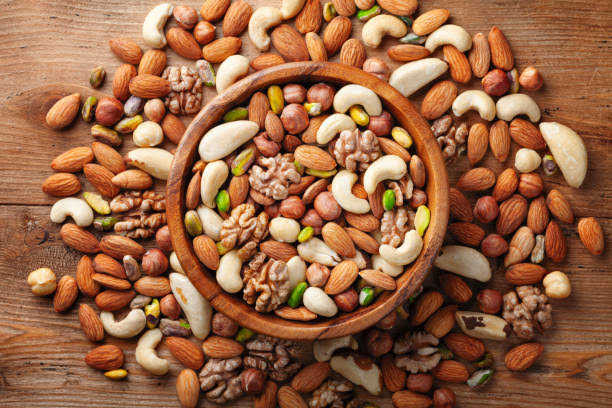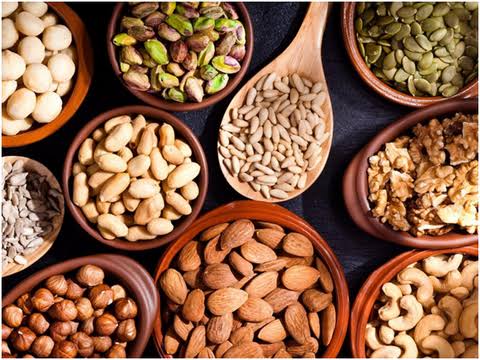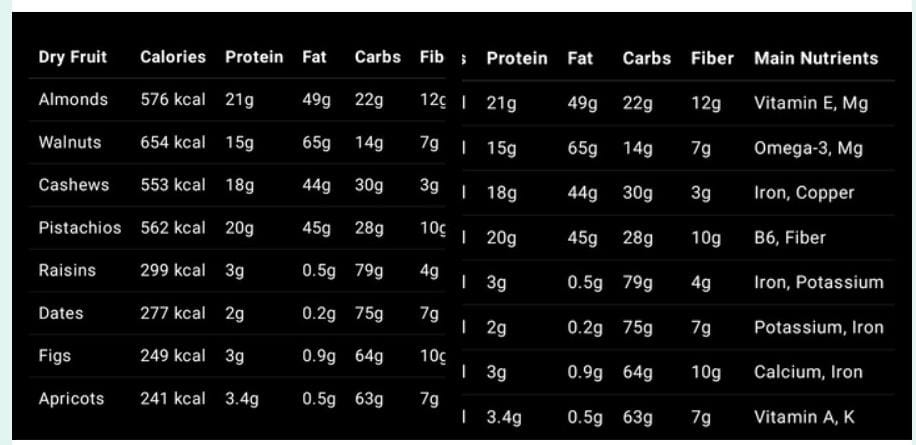Health Desk
Tv10punjab
Dry fruits are nature’s powerhouse of nutrition. They are tasty, long-lasting, and packed with essential vitamins, minerals, healthy fats, and antioxidants. Eating them daily in the right amount can help improve your overall health, energy levels, and even mental sharpness.

In this article, we will explore:
What are dry fruits
Types of dry fruits
Nutrition value of common dry fruits
Health benefits of eating dry fruits daily
Best time to eat them
How much to eat per day
Precautions and side effects if eaten in excess
Conclusion
What Are Dry Fruits?
Dry fruits are fruits from which most of the water content is naturally or artificially removed. This makes them lighter, sweeter, and richer in nutrients.
Some dry fruits are naturally dried in the sun (like raisins, figs, dates) while others are dehydrated using machines (like packaged dried mango, berries, etc.).

Dry fruits are different from nuts, but in common language, people often mix the two. Nuts like almonds, walnuts, pistachios, and cashews are actually seeds, but they are included in the “dry fruits” category because they are also dry and nutrient-dense.
Types of Dry Fruits
Here are the most popular types of dry fruits:
a) Almonds (Badam)
Rich in vitamin E, magnesium, and healthy fats.
b) Walnuts (Akhrot)
Loaded with omega-3 fatty acids, great for brain and heart health.
c) Cashews (Kaju)
Creamy in texture, rich in iron, copper, and magnesium.
d) Pistachios (Pista)
Good source of protein, vitamin B6, and fiber.
e) Raisins (Kishmish)
Natural sweetener, full of iron, potassium, and antioxidants.
f) Dates (Khajoor)
High in natural sugar, fiber, and minerals like potassium.
g) Figs (Anjeer)
Excellent for digestion, rich in calcium and iron.
h) Apricots (Jardalu / Khumani)
Good for eye health, rich in vitamin A and antioxidants.
Nutrition Value of Common Dry Fruits
Here’s an approximate nutritional value per 100g of popular dry fruits:

Health Benefits of Eating Dry Fruits Daily
- Boosts Energy Levels
Dry fruits are high in natural sugars, healthy fats, and protein, making them a quick source of energy. Athletes and busy professionals often snack on them for instant fuel.
- Improves Heart Health
Walnuts, almonds, and pistachios contain healthy fats and antioxidants that lower bad cholesterol (LDL) and improve good cholesterol (HDL), keeping your heart healthy.
- Supports Brain Function
Walnuts are especially good for brain health due to their omega-3 fatty acids. Vitamin E in almonds also protects brain cells from damage.
- Helps in Weight Management
Although dry fruits are calorie-dense, they are also rich in fiber and protein, which keep you full for longer and reduce unhealthy cravings.
- Good for Skin and Hair
Vitamin E, antioxidants, and healthy fats in almonds, walnuts, and pistachios nourish your skin, make it glow, and prevent hair fall.
- Improves Digestion
Figs, apricots, and raisins have natural fiber that prevents constipation and supports a healthy gut.
- Strengthens Bones
Dry fruits like almonds and figs are rich in calcium and magnesium, which help maintain bone density and prevent osteoporosis.
- Controls Blood Sugar Levels
Despite their natural sweetness, many dry fruits have a low to moderate glycemic index, meaning they release sugar slowly into the bloodstream. This helps in controlling blood sugar spikes.
- Boosts Immunity
The antioxidants, vitamins, and minerals in dry fruits improve the body’s defense system, making it easier to fight infections.
- Supports Eye Health
Apricots and raisins are rich in vitamin A, which helps maintain clear vision and prevents eye diseases.
Best Time to Eat Dry Fruits
Morning: Eating soaked almonds, walnuts, or raisins in the morning on an empty stomach helps absorb nutrients better.
Before Workout: Dates and raisins give a quick energy boost.
Evening Snack: A handful of mixed nuts can replace junk food cravings.
Avoid eating dry fruits late at night in large amounts as they may cause indigestion.
How Much to Eat Per Day
Dry fruits are healthy, but they are calorie-rich. Eating too much can lead to weight gain.
A safe daily portion is:
Almonds: 5–7 pieces
Walnuts: 2 halves
Cashews: 4–5 pieces
Pistachios: 8–10 pieces
Raisins: 1 tablespoon
Dates: 1–2 pieces
Figs: 1–2 pieces
Mixing them in small portions is better than eating a large quantity of one type.
Precautions and Side Effects
Weight Gain: Eating too many dry fruits can lead to extra calories.
High Sugar: People with diabetes should eat sweet dry fruits like dates and raisins in moderation.
Allergies: Some people are allergic to nuts like cashews or almonds.
Digestive Problems: Excessive fiber from dry fruits can cause bloating and gas.
Always choose unsalted and unsweetened dry fruits for maximum health benefits.
Conclusion
Dry fruits are a small but powerful addition to your daily diet. They provide essential vitamins, minerals, healthy fats, and antioxidants that can improve your heart health, brain function, digestion, skin, and immunity. Eating them daily in the right amount can help you stay energetic, active, and healthy.
The key is moderation — just a small handful a day is enough to get all their benefits without side effects. So, make dry fruits a habit, and your body will thank you with better health, glowing skin, and strong immunity.